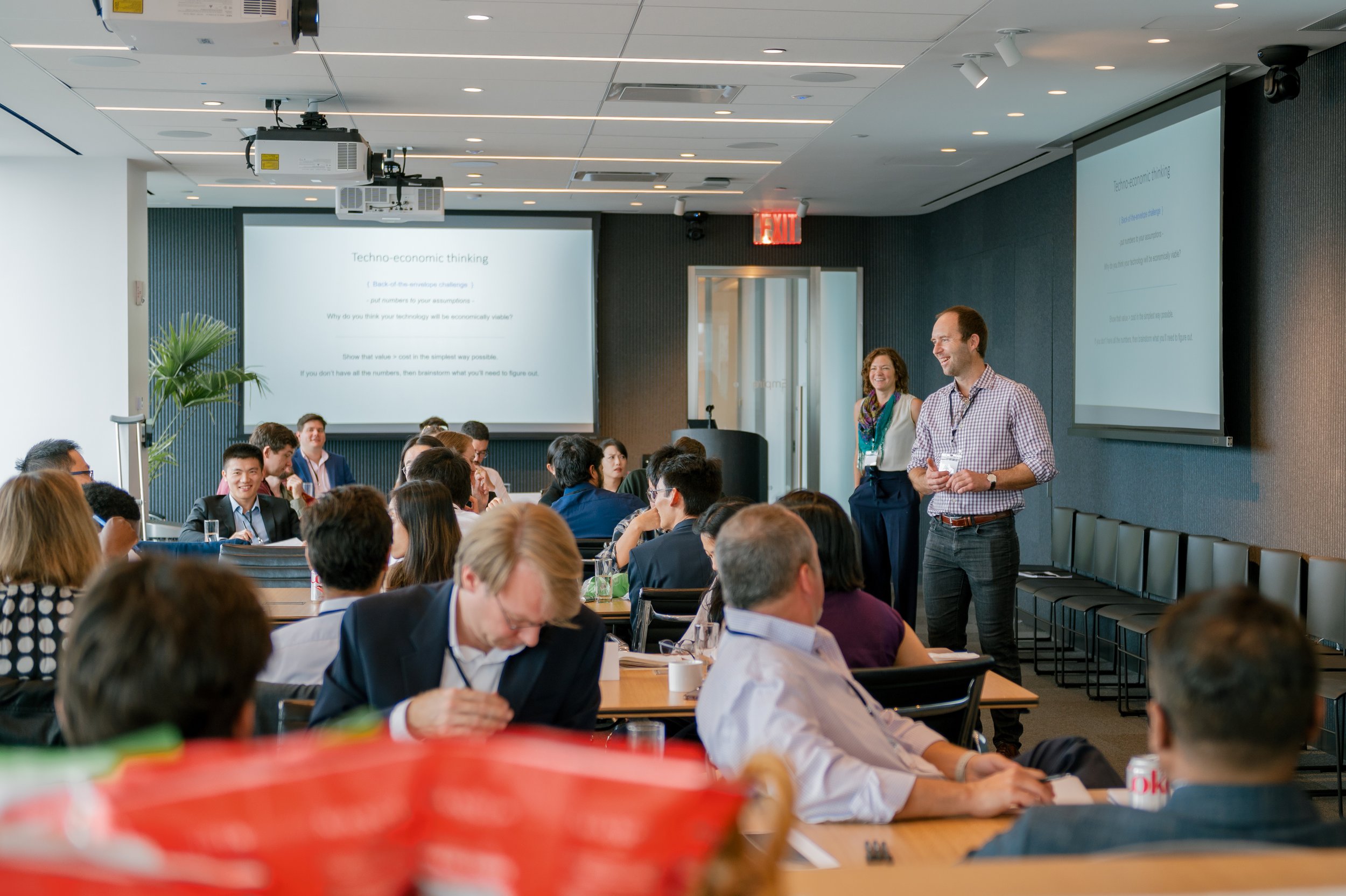Cultivating early talent in high-risk, high-potential industries
October 25, 2024
Activate provided entrepreneurial training to leading geologic hydrogen researchers at New York Climate Week in partnership with ARPA-E.

It is challenging for any new technology to make it to market, even in industries with well-established ecosystems. Breaking through in a brand new industry? It’s even harder.
But it’s not impossible.
And in fact, it’s more necessary than ever. Climate disasters like Hurricanes Helene and Milton underscore the undeniable urgency to deploy innovative climate solutions, and relying on incremental advances in our current industries won’t be enough.
Instead, we need technology moonshots. This means getting transformative technologies out of the lab, into the market, and out into society where they can make an impact—as swiftly as possible.
“We need technology moonshots. ”

In this spirit, Activate teamed up with ARPA-E to host a two-day workshop at New York Climate Week, with support from Brown Rudnick LLP and Rose Rock Bridge, aimed at convening talent, knowledge, and community around supporting the development of geologic hydrogen—a pathway that could potentially harness clean, sustainable, and low-cost hydrogen production using natural processes within the earth. We invited some of today’s most promising scientists—32 research awardees in ARPA-E’s geologic hydrogen program—and used Activate’s interactive entrepreneurship curriculum to introduce concepts like value chains and markets, techno-economics, and elevator pitches.
One of our key goals was to increase collaborative potential between the research and commercialization communities. We brought in powerhouse speakers to share deep insights into commercialization including ARPA-E Director Evelyn Wang; Justina Gallegos, Deputy Director of the White House Office of Science and Technology Policy; and Richard Hartman, Chief Innovation Officer for the Air Force Office of Energy Assurance. Additionally, a room full of investors, policy experts, government stakeholders, non-profit leaders, and industry veterans gave feedback to the researchers on their pitches, offering rich perspectives on translating science into real-world impact.
“The geologic hydrogen industry is experiencing a pivotal moment of change,” said Douglas Wicks, Program Director at Advanced Research Projects Agency-Energy (ARPA-E). “I’m thrilled that Activate and ARPA-E collaborated on this workshop to help spark further connections between researchers and industry in this space and build momentum as this community learns quickly together.”
For example, Prince Ochonma, a PhD candidate at Cornell University in the Department of Chemical and Biomolecular Engineering, is developing a technology that combines minerals present in rocks with water-soluble catalysts to stimulate hydrogen in the subsurface environment. He found the workshop inspiring. “Prior to the workshop, the enormous nature of the supply chain required to achieve geologic hydrogen production at scale appeared daunting,” he said. “However, networking with like-minded scientist entrepreneurs working to solve several key problems, including the development of more effective resource exploration technologies, better drilling approaches, and more efficient hydrogen storage technologies, was reassuring.”
Activate knows a thing or two about supporting new, daunting categories of science. Several Activate Fellow alumni have founded category-leading companies in industries that previously did not exist: Etosha Cave and Kendra Kuhl (Twelve, Cohort 2015, Cyclotron Road) revolutionizing carbon transformation, Tim Latimer and Jack Norbeck (Fervo Energy, Cohort 2018, Cyclotron Road) leading next-generation geothermal, and Cody Finke (Brimstone, Cohort 2019, Cyclotron Road) and Leah Ellis (Sublime Systems, Cohort 2020) inventing carbon-free cement are just a few examples. Activate’s support at these innovators’ earliest stages allowed them to take on the challenges of commercializing high-risk, capital-intensive technologies—and then go on to reimagine entire industries with huge potential for impact.
“Several Activate Fellow alumni have founded category-leading companies in industries that previously did not exist. ”
The first-of-its-kind workshop at New York Climate Week successfully distilled some of the signature aspects of Activate’s two-year fellowship into a two-day workshop focusing on understanding the basics of value creation and how to communicate the potential value of technology. Based on participants’ feedback, we learned that a two-day workshop can be transformative.
“It was truly a life-changing experience.”
“Events like these, where meaningful connections are made, are priceless.”
These are just a few of the heartfelt participant responses we received, which reflect Activate’s uniquely powerful approach. “We believe that hard-tech entrepreneurship is a team sport, which goes against the societal model of the ‘lone entrepreneur’ or the sole ‘unicorn’—we don’t believe that’s how change happens,” says Sarah Morrill, Activate’s VP of Strategy. “We believe hard problems aren't solved alone, but through community that can accelerate commercialization together."
“We believe hard problems aren’t solved alone, but through community that can accelerate commercialization together. ”
We’re excited about future opportunities to use this model to cultivate untapped science entrepreneurship in more spaces, from government agencies like ARPA-E to corporate settings and universities. We are piloting these engagements with a handful of partners this year, and are eager to support more players in the hard-tech space who want to catalyze the formation of new markets with a complex set of stakeholders.
“I believe this is the start of something big,” said Kevin See, Head of Ecosystem at Activate. “There is often a disconnect between foundational research and true commercial impact. Bridging that gap means higher leverage on the research dollars spent, creation of new career paths, and ultimately higher likelihood of solving our biggest challenges.”
Are you interested in jumpstarting emerging ecosystems in hard-tech commercialization? Partner with us.


.jpg)



